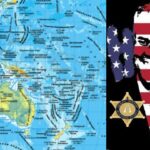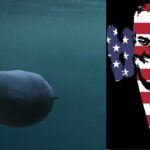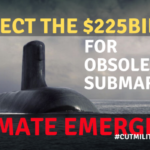A Backdoor to Going Nuclear: An Interview With the Raucous Anti-AUKUS Caucus’ Jacob Grech

Scott Morrison dropped it on the Australian public on 16 September that he’s embroiled the nation in a “forever partnership” with the US and the UK. The PM explained the AUKUS pact is in response to rising security concerns in the Indo-Pacific region – in other words, China.
Later that day, defence minister Peter Dutton appeared before the US press to further discuss the pact, explaining it would involve an increasing US presence in Australia, with more marines rotating through the north, as well as ordnance development. This time, China was specifically mentioned.
The following week saw Morrison hobnobbing it over in the States, where he not only spruiked AUKUS, but met with the leaders of India, Japan and the US to discuss the Quad (the Quadrilateral Security Dialogue). And the heads of state asserted this has nothing to do with China.
On the same day as the initial AUKUS announcement, the Chinese Communist Party warned through its mouthpiece the Global Times, that it understands that Australia is now “escalating its confrontation with China” and if it continues, it “will certainly punish it with no mercy”.
Atom-splitting subs
As the official line goes, the key aspect to the initial stage of the AUKUS agreement is that the United States will be sharing its nuclear technology with Australia, which will enable this nation to build eight nuclear-powered submarines to patrol the Indo-Pacific.
The decision to go nuclear wasn’t run by the Australian public prior to making this arrangement. China has since warned that the subs are a particularly problematic aspect to our war posturing, and Malaysia and Indonesia have suggested the vessels could spark a regional nuclear arms race.
Underlying this part of the deal is that obtaining nuclear subs will be a foot in the door to create an Australian nuclear industry, which may sound inviting to the mining industry, as fossil fuels have become unviable and renewable energy seems to be akin to betrayal within that sector.
As he took office in early 2020, current Australian resources minister Keith Pitt announced that he sees more investment in fossil fuels and nuclear energy as the way forward for the nation. Indeed, he was a member of a 2019 upper house inquiry that recommended establishing a local industry.
The Raucous Anti-AUKUS Caucus
The Renegade Activists is an antiwar group that has been organising since the late 1980s. And the renegades have put together the Raucous Anti-AUKUS Caucus, which will meet online on the evening of 7 October.
Made up of a number of notable antiwar activists, academics and politicians, the caucus will involve discussion of some of the lesser publicised aspects to the “forever partnership”, as well as facilitate the meeting of like-minded locals to commence organising resistance to the AUKUS pact.
Sydney Criminal Lawyers spoke to Renegade Activists spokesperson Jacob Grech about the implications of going nuclear, the pivotal role that Australia is playing in the lead up to potential war with China, and the position our PM would take in a brawl in the school playground.
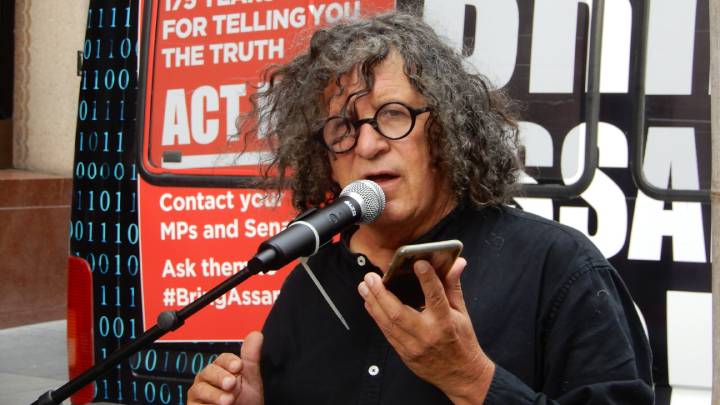
Firstly, on 16 September, prime minister Scott Morrison sprung it on the Australian public that his government has involved the nation in a “defence” pact with the United States and the United Kingdom.
The announcement was accompanied by much fanfare. Jacob, what are your thoughts on what’s known as the AUKUS pact?
To start with the problem is we don’t even know what AUKUS is. We don’t know if it is a pact. We don’t know if it is going to be a treaty, if it’s ever going to be formalised, or whether they’re going to keep it as some sort of amorphous forever partnership.
What it does do, however, is it signifies to the rest of the world, particularly countries in our region, that we’ve given away any semblance of being even handed between the United States and China, as we’ve cast our lot more firmly than ever before into the United States camp.
That is a worry for regional security. It is a worry for regional trade. And it is a worry for Australian industry.
A key aspect of the recent announcement was that the pact involves the US providing Australia with the means to go nuclear in the form of eight submarines.
What are the implications of this both domestically and on the global stage?
To start with on the domestic front, we are supposedly having nuclear submarines without any kind of real nuclear industry. That’s apart from one research reactor and, of course, major uranium mining.
So, we’re afraid it’s a backdoor way to develop a local nuclear industry.
An argument that people who are opposed to the nuclear industry use is the idea of an end user responsibility in terms of a waste dump. So, people who are using the product have the responsibility to deal with the waste.
So, there’s that aspect. And it opens up a number of other things.
First of all, it will expand our nuclear technology to develop the highly enriched – and just about weapons grade – nuclear material to run these submarines. And this will increase nuclear research in Australia, which will increase education prospects for the nuclear industry through universities.
Secondly, it would make it incumbent on Australia to take responsibility for a larger part of the nuclear industry.
While globally, it creates many more problems. Currently, every country that has a nuclear-powered submarine also has nuclear weapons. We’d be the first country that doesn’t.
As far as the treaties go, the rules of the IAEA (International Atomic Energy Agency) treaty to safeguard nuclear material has a loophole, which excludes nuclear material for the propulsion of naval vessels.
That was put in because the United States, primarily, wanted to keep secret the locations of its nuclear warships, including submarines.
If they had to talk about where all their additional material was, they would have to disclose the location of their submarines.
What that did was it made a loophole, with Australia being the first nation to exploit it. Although there had been warnings that other countries might do this.
Iran was talking about developing a nuclear submarine a few years ago. And people were saying it was going to be a way of developing highly enriched uranium under the guise of submarine propulsion in order to develop their nuclear weapon system.
I’m not suggesting that Australia is going to use this as a guide to develop its own weapons potential.
But it does make it impossible for the United States, the United Kingdom or anyone else who supports Australia’s nuclear-powered ambitions to oppose any other country developing nuclear-powered warships.
It also runs contrary to a whole lot of other treaties on nuclear safeguards and non-proliferation that Australia is a party to, not that they’re particularly strong.
It could be breaking the non-proliferation treaty, and international lawyers are looking at that. But if it’s not breaking it, it’s running very close to the wind.
Another implication with the nuclear submarines, is that with the French ones, we were talking about the first not even being ready for at least another ten years.
The big decision here was to go nuclear, not to have this brand or that brand. And now that we’ve accepted that Australia will have nuclear submarines, it makes us able to take on a couple of existing US submarines that were being mothballed and retired this month.
There is the Los Angeles class, which are currently stationed in Guam. There’s talk in US military circles about some of those being sent to Australia on a lend-lease style agreement. So, we could have nuclear submarines as early as 12 months from now.
A week after the AUKUS announcement while the PM was in the US spruiking the pact, he also met with the leaders of the Quad security dialogue, which involves Australia, the US, Japan and India.
Even though all of these nations are situated in the Indo-Pacific region, the Quad leaders assure this alignment has nothing to do with Beijing.
What are your thoughts on our country coming out so vocally as part of both AUKUS and the Quad within a matter of a week?
The two are linked. I don’t think the readers would need any persuasion in thinking both the Quad and AUKUS are very firmly aimed at limiting China. So, let’s just take that as tacit.
With AUKUS, a big part of it is the attempt by Australia to keep itself as the first friend of the United States. The United States has been talking with Japan, South Korea and India.
In some ways, the US has been getting too close to Japan. For example, there was even talk about Japan joining the Five Eyes intelligence sharing network. And this, to an extent, diminishes Australia’s role as a sub-imperial power in the region.
So, with Australia signing up to AUKUS – and putting itself out there squarely as the United States’ first friend – the next step was to go to the Quad meeting, with Joe Biden, to let them know that the United States and Australia are part of a separate caucus or a sector within the Quad.
It was a message to India, Japan, and others in the region – like Singapore and Taiwan – that the main deal here is the US-Australian alliance.
The UK has also come into it for its own reasons, not least the fact that the Johnson government is trying to reposition itself on the world stage in the aftermath of the Brexit catastrophe.
Via its mouthpiece the Global Times, the Chinese Communist Party has stated in response to AUKUS that “Australia has turned itself into an adversary of China”, and if it continues to provoke it, “China will certainly punish it with no mercy”.
Should this be taken lightly?
Should the largest country in the world, which is a growing power, with a growing military, and our major trading partner, threatening to punish us mercilessly be taken lightly? Well, you would be a fool to take it lightly.
For quite some time, China has been saying that they would punish Australia, should we get involved with United States plans to support Taiwan.
As recently as two months ago, they put out a statement warning Australia, saying that they would attack Australia with conventional weapons. They said they would make conventional weapon strikes on Australian territory aimed at military targets.
The interesting thing is in the latest Global Times piece that you’re referring to, they left out the words conventional weapons when they said they would punish us mercilessly.
So, now that we have nuclear submarines, we are, in their minds, a nuclear power. But this is more than about the submarines.
Peter Dutton has come out and said that he wants to store different types of ordnance in Australia. We know that the United States has been looking for a regional land base for its nuclear and hypersonic weapon systems for a long time.
They admitted that when Mark Esper, the former US secretary of defence under the Trump administration, visited Australia in 2019. He said that was what they were looking for.
That was probably the genesis for the discussions about AUKUS, because something like AUKUS doesn’t occur overnight.
It was sprung on us. And it was also sprung on the military. People in the Department of Defence were so caught short by the AUKUS announcement that the department is actually providing counselling to those who have been distressed by the news.
So, this secret agreement, which has been in the planning for some time –because it takes time to organise these things – includes, not just submarines, but also increased troop deployments in Australia and potential lend-lease agreements on submarines, and the possibility of hypersonic and nuclear weapons bases in northern Australia.
Peter Dutton has strongly alluded to that. He just stopped short in coming out and saying that we will host weapons systems.
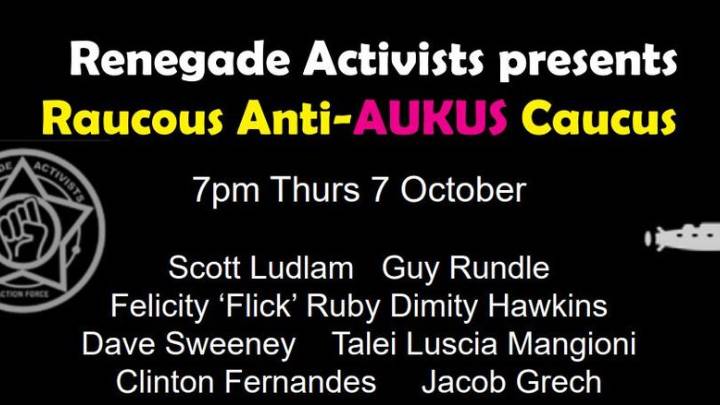
As part of the group Renegade Activists, you’ve organised the Raucous Anti-AUKUS Caucus. What’s that involve?
It’s on Thursday night, 7 October. Because a lot of the dialogue in the media has been about the submarines, what we are doing is having a webinar to talk about the various aspects of AUKUS, not just the subs.
To that, we’ve got Professor Clinton Fernandes, who is an expert on strategic studies at UNSW. We’ve got anti-nuclear activists Dave Sweeney, Felicity ‘Flick’ Ruby and Dimity Hawkins.
We’ve got journalist Guy Rundle, former Greens Senator Scott Ludlum, Talei Luscia Mangioni on the Indo-Pacific, and me.
We’re going to talk about the various aspects of AUKUS. But more than that, at the end of the talks, we’re setting up online breakout rooms, where people can get together and discuss how they’re going to oppose the pact.
So, it’s an attempt to not just be talking heads and saying why this is wrong, but, as Renegade Activists are activists, the idea is to get people to organise against the agreement.
And lastly, Jacob, during a recent American television interview, the prime minister said that he didn’t believe that conflict with China is “inevitable”, and he thinks it’s “completely avoidable”.
But ultimately, he continued, the issues “are going to be resolved principally between the United States and China”, and they aren’t “going to be resolved directly by Australia”.
What does this response tell us about how Morrison is running the nation?
What a mealy-mouthed piece of work that is. For a start, the word “inevitable” – if I say something is not inevitable, then I am basically saying it is quite probable.
I wouldn’t say something isn’t inevitable if there was a very low risk of it happening.
By saying it’s not inevitable, you’re admitting it is highly likely. That’s the use in English. And Scott Morrison, whatever else you want to say about the man, is a marketer and he knows how to use the right words.
So, when he then said it was “avoidable”, he was again saying it was likely. And by saying it’s avoidable, he’s saying not by us, but it’s China that can avoid it.
He’s a very mealy-mouthed man. He reckons China can avoid it by following what Australia calls “the rules-based order”, which has become an international weasel term.
As for saying Australia is not going to be the determining factor, that’s like his classic line, “I don’t hold a hose, mate.” He wants to egg it on. He wants to be seen as the person standing beside the bully.
It’s the classic scenario of the little bloke standing next to his strong mate egging him on to fight. Then afterwards, he can just stand back and say, “It wasn’t me, mate. It wasn’t me.”
This is a cowardly, weaselly comment, aimed at egging on the United States, while at the same time, Morrison has given himself lots of room to exit – as has been the mark of his prime ministership –and absolve himself of any responsibility for anything that goes wrong based on his decisions.


